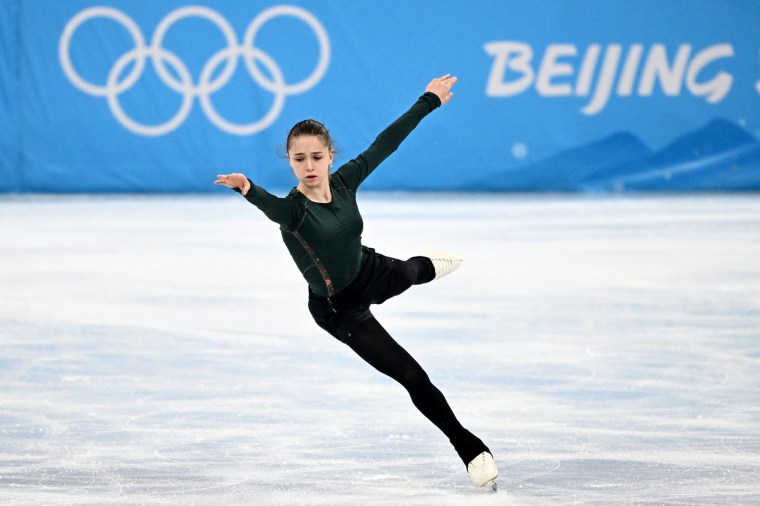This was the week figure skater Kamila Valieva sealed what looked set to be the first of two gold medals — and her stardom. But the revelation of a positive drug test has left the teenage phenom's Winter Olympics future in doubt, and raised fresh questions about Russian authorities and doping.
Anti-doping officials said Friday they would seek an urgent hearing to decide Valieva's fate after confirming she had tested positive prior to the Games and was briefly suspended by Russian officials, only to have the ban lifted. All eyes will now turn from the Beijing ice to the Court of Arbitration for Sport, which will decide whether she is able to compete next week in the women's single event.
Valieva is the clear favorite for another gold if she does, with the 15-year-old becoming the first woman to land a quadruple jump at the Olympics as she led the Russian team to victory in the team event on Monday.
The Russian Olympic Committee has said it will fight to keep those gold medals and the Kremlin has offered Valieva its vocal support. But the saga, which first came to light when the medal ceremony for the team event was delayed this week, has thrust doping back into the sporting spotlight.
Valieva tested positive for the banned substance trimetazidine at the Russian Figure Skating Championships in Saint Petersburg, Russia, on Dec. 25, 2021, the International Testing Agency, which oversees the Olympic drug testing program, said Friday.
A Swedish laboratory reported the findings on Tuesday, a day after Valieva helped the Russians skate to gold and just hours before the medal ceremony, which was then postponed, the agency said.
The World Anti-Doping Agency said the Swedish laboratory reported the findings on Monday. The reason for the discrepancy between the timelines was not immediately clear.
Valieva was provisionally suspended on Tuesday by the Russian Anti-Doping Agency, but the next day she appealed and the decision was reversed, the World Anti-Doping Agency and the International Testing Agency said. The reason why her suspension was lifted was not immediately clear.
NBC News has contacted the Russian Anti-Doping Agency for comment but has received no response.
ITA said it would lodge an appeal with the Court of Arbitration for Sport on behalf of the International Olympic Committee over the Russians' decision to reinstate the star and let her skate. The World Anti-Doping Agency also said it was appealing.
"A decision is needed before the next competition the athlete is due to take part in," the International Testing Agency said, explaining why it wasn't waiting for the “reasoned decision” by the Russian anti-doping agency. Valieva is due to compete in the women’s single skating event on Tuesday.

A lot hangs in the balance, including whether the Russians’ gold medal in the team event stands. The United States took silver.
Russian athletes are in Beijing competing as the Russian Olympic Committee (ROC), after the country was banned because of a state-sponsored doping scheme at the 2014 Sochi Olympics. They are not able to compete under their country’s name, or with its flag or anthem.
Kremlin spokesman Dmitry Peskov said Friday that Moscow “infinitely and completely” supports Valieva, adding: "We are convinced that we are talking about some kind of misunderstanding."
“Kamila, don’t hide your face,” he told a news briefing. “You are a Russian, walk proudly and most importantly perform and win.”
The Russian Figure Skating Federation said in a statement that it did not doubt Valieva’s “honesty and cleanliness.”
But German skating icon Katarina Witt said the scandal engulfing Valieva was inhumane and that adults responsible should be banned forever.
"As an athlete, you always follow the advice of your confidants, in this case she probably followed her coach and medical team,” she said on Facebook, according to Reuters.
“Such cases are not helpful to the Games,” IOC spokesman Mark Adams said. “These cases need to be prosecuted properly, taken care of properly and due process needs to be gone through.”
As a minor, Valieva is considered a protected person under the sports’ rule book — the World Anti-Doping Code and so could ultimately receive just a simple reprimand, according to The Associated Press.
When a minor is implicated in doping rules violations, the rules state her entourage, such as coaches and team doctors, must be investigated, too, according to the AP.